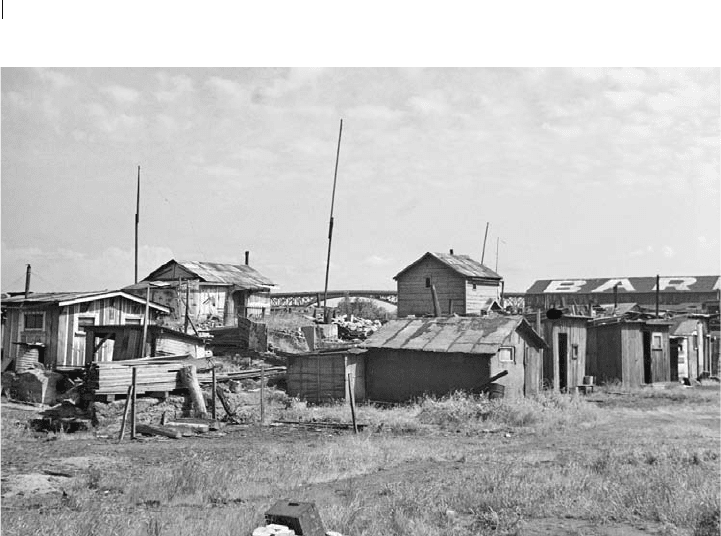Danver Steven L. (Edited). Revolts, Protests, Demonstrations, and Rebellions in American History: An Encyclopedia (ENG)
Подождите немного. Документ загружается.


their homes. The name arose because people blamed President Herbert Hoover
for their plight and the failure of government to help them cope with economic
collapse.
Hoovervilles were characterized by shacks and jerry-built structures of what-
ever material was at hand. Would-be residents scavenged for tarpaper, lumber
scraps, tin, cardboard, canvas and whatever else they could find. The lucky ones
had carp entry skills and could build reas ona bly solid housing. Masons built 20 -
foot-tall shanties of old bricks and stone. The less skilled combined packing boxes
and other discarded material into primitive shelter. Empty water mains were the
recourse of the most unfortunate.
Central Park in New York City had one of the largest Hoovervilles. Other
Hoovervilles were in Midwest and West Coast cities as well as points in between.
In the Mississippi River Valley, drought brought crop failure and loss of farms and
forced former farmers into Hoovervilles.
As the Depression persisted in the 1930s, homelessness spread as increasing
numbers lost their homes to delinquent taxes and foreclosed mortgages after they
lost their jobs. The alternative was taking to the roads. Between 1929 and 1933,
over 100,000 businesses failed, and Hoover left office in 1933 with 13 million
unemployed, nearly a fourth of the total workforce.
838 Bonus Army (1932)
Shantytown outside of Portland, Oregon, in April 1936. When the failing economy did not
respond to President Herbert Hoover's initiatives, the Great Depression worsened, and
Hoover was blamed for the collapse. Hooverville was the name given to shantytowns that
were occupied by those most severely hurt by the economic calamity. (Library of Congress)

Attempts to eliminate Hoovervilles were normally unsuccessful, a nd govern-
ments proved unable to deal with the health issues that shantytowns without sani-
tation created. Cities generally took on New Deal programs o nly reluctantly and
balked at most, particularly efforts to establish city housing authorities and public
housing. Opponents argued that public ho using would depress al ready-low prop-
erty values and smacked of communism. Corrupt government officials often took
what assi stance w as availab le before it could reach the needy sick, hungry, and
homeless.
When Seattle’s homele ss established their Hooverville, the health department
had it burned down. The men rebuilt, and again the city destroyed the shantytown.
The third time the Hooverville was dug into the ground, and the city agreed to
allow i t to remain if the residents established adequate sanitation. Other cities
sometimes evicted residents for trespass, but most ignored the Hoovervilles if they
were quiet.
In some of the larger Hoovervilles, the residents organized, chose a mayor, and
established committees to deal with sanitation and other community matters.
Commonly, the more fortunate came to the Hoovervilles to gawk. Usually they
found a resident to serve as guide and point out the various sights. Donations went
into a community chest shared by all Hooverville residents. Other resi dents
resorted to begging. A University of Washington sociology student bought a shack
in the King County Hooverville in 1934 for $15 and wrote a master’s thesis, “Hoo-
verville, a Study of a Community of Homeless Men in Seattle,” based on inter-
views with 650 residents.
There were also Hoover blankets, newspapers serving as blankets; the Hoover
flag, or empty pocket turned inside out; and Hoover leather, cardboard that li ned
shoes and covered holes in soles. A car pulled by horses because the owner could
not afford gasoline was a Hoover wagon; in Canada, a Bennett buggy. With the
beginning of World War II and the end of the Great Depression, shanty eradication
programs destroyed Hoovervilles, which slowly faded from memory.
—John H. Barnhill
Further Reading
“The Great Depression, the 1930s: Hoovervilles.” U-S-History.com. http://www.u-s-history
.com/pages/h1642.html (accessed July 19, 2010).
Lange, Greg. “Hooverville: Shantytown of Seattle’s Great Depression,” HistoryLink,
January 18, 1999. http://www.historylink.org/index.cfm?DisplayPage=output.cfm&file
_id=741 (accessed July 19, 2010).
Lometa. “Hooverville,” Everything2.com, April 19, 2000. http://everything2.com/e2node/
Hooverville (accessed July 19, 2010).
Bonus Army (1932) 839

MacArthur, Douglas (1880–1964)
Douglas MacArthur, son of General Arthur MacArthur, was born in 1880 in Little
Rock, Arkansas. He had a distinguished military career characterized by rapid
promotion due to competence and connections. He was bold to the point of insub-
ordination. He was first in the 1903 class at West Point and received a commission
in the Corps of Engineers. His first duty station was in the Philippines, where in
1904, he received the rank of first lieutenant. He served with his father and
observed at Tokyo during the Russo-Japanese War until he became aide-de-camp
to President Theodore Roosevelt in 1906. He observed at Vera Cruz, made major
at the suggestion of General Leonard Wood, and was a division commander in
World War I, receiving 13 decorations and seven citations for bravery. In 1918,
he became brigadier and subsequently became the youngest division commander
in France, youngest commandant of West Point, and, in 1922 in the Philippines,
the youngest full general. He served as president of the A merican Olympic com-
mittee before becoming the youngest army chief of staff in 1930.
MacArthur was noted through his career as a modernizer, a brave soldier, and a
right-wing zealot. His behavior in 1932 in leading cavalry, infantry, and tanks
against the Bonus Army encampments in Washington, D.C., was characteristic.
In justifying his actions by claiming that he was forestalling a communist revolu-
tion, MacArthur was true to his strong belief that the Bonus March was actually
a c ommunist plot to overthrow the government, not just an effort to get money
from th e government. Not even ge neral staff intelligenc e information that only
three of the BEF leaders had communist ties was able to shake his conviction.
He also disregarded reports that the rank and file were overwhelmingly anticom-
munist and really were just needy veterans trying to get their bonus early.
When President Herbert Hoover ordered federal troops to cordon off the veterans
who resisted Police Chief Pelham Glassford’s order to evacuate condemned build-
ings on Pennsylvania Avenue, MacArthur sent in Major George Patton and tanks,
infantry, and cavalry with weapons drawn. Gas, bayonets, clubs, and sabers inflicted
hundreds of injuries. With the veterans in retreat, Hoover ordered MacArthur to halt.
MacArthur disregarded the order and sent his troops across the Anacostia River,
burning the camp.
American public opinion was overwhelmingly favorable, but press treatment was
not. When the dust settled, Hoover was a former president, Franklin Roosevelt, who
regarded MacArthur as a major menace to U.S. democracy, was in the White House,
and MacArthur was in the Philippines, safely out of the way.
With MacArthur’s reputation in tatters, newspaper writers took on the general.
Political gossip c olumnist Drew Pearson criticized MacArthur and reported that
840 Bonus Army (1932)

MacArthur had become major general due to the efforts of his father-in-law,
Edward T. Stotesbury, MacArthur sued for $1.75 million. When Pearson’s source,
MacArthur’s former wife, refused to testify in court, Pearson convinced MacArthur’s
Philippine mistress to give him love letters from MacArthur. The general dropped
his suit.
In 1935 MacArthur returned to the Philippines to organize the defense of the
island chain. Retired from the army in 1937, he became military advisor to the
Philippines. Recalled to active duty as a major general in 1941, he attempted
unsuccessfully to defend the Philippines and became a hero again in the Pacific
theater. After World War II, he rebuilt Japan on the American model. He com-
manded in Korea (before being relieved by President Truman for insubordination
in rejecting civilian oversight of military. MacArthur was an icon of the right wing
in American politics even after his death in 1964.
—John H. Barnhill
Further Reading
History Learning Site. “Douglas MacArthur.” http://www.historylearningsite.co.uk/
douglas_macarthur.htm (accessed September 2008).
Lisio, Donald J. The President and Protest. Bronx, NY: Fordham University Press, 1994.
Manchester, William. American Caesar. New York: Dell, 1983.
“MacArthur.” Sparta cus.s chooln et. http:/ /www.spartacu s.schoolnet.co.uk/USAmacarthur
.htm (accessed September 2008).
Public Broadcasting Service. The American Experience; People & Events. “The Bonus
March (May–July 1932).” http://www.pbs.org/wgbh/amex/macarthur/peopleevents/
pandeAMEX89.html (accessed September 2008).
Veterans’ Rights
Veterans through history have enjoyed political clout and the ability to menace the
incumbent government. Caes ar appeased his veterans. When in 1783, 400 Penn-
sylvania veterans marched on the state house and demanded Congress provide
their back pay, Congress bailed out, the army removed the veterans, and the United
States established a capital protected from its citizens, Washington, D.C.
After World War I about four million veterans returned to find that replacement
workers were not willing to step aside and give them their jobs back. To compen-
sate for their wartime pay of a dollar a day, Congress authorized them to receive
bonuses for their wartime and overseas duty. But Wilson and Coolidge
Bonus Army (1932) 841

consistently vetoed bonus bills. In 1924, Congress finally overrode the veto and
authorized a bonus of approximately $1000 per veteran—payable in 1945. In
effect, veterans had an insurance policy that matured in two decades, what many
of them referred to as their “tombstone bonus” because they expected to be dead
by 1945.
When the Depression struck, veterans were homeless and jobless in large num-
bers, and agitation grew for immediate payment. To Washington, D.C., marched
45,000 World War I veterans in 1932. They established their integrated shanty-
towns and vowed to stay until 1945 if necessary. The Bonus Army attempted to
press Congress to act, and in 1932 the House passed a bill by Wright Patman
authorizing $2.4 billion for veterans cashing in their 1945 certificates. The Senate
defeated the bill, and the BEF, despite fears it would attack Congress, merely sang
“America,” and left.
Fearing a revolution, Hoover s ent in the troops and evicted the first Bonus
Army. The BEF disbanded, but a second formed in 1933 and a third in 1934.
President Roosevelt, as had th e previous four presidents, refused to support the
bonus. Roosevelt had a consistent history of opposing extra privileges for veter-
ans. Instead he sent the veterans to “veterans’ rehabilitation camps” where they
made a dollar a day. When the most severe hurricane on record hit the Florida
Keys on Labor Day 1935, killing over 250 veterans, a shocked Congress overrode
Roosevelt’s veto in 1936 and passed a Patman bill that authorized immediate pay-
ment of the war bonus. In 1936 the post office delivered $1.9 billion to 3.5 million
veterans.
In a fireside chat of 1943 on the 11th anniversary of the battle of Anacostia
Flats, Roosevelt promised that never again would the United States mistreat its
veterans. With the liberation of Europe on the horizon in 1944, veterans’ organiza-
tions and Congress began exploring ways of preventing a repeat of the BEF abuse.
The result was the GI Bill of Rights. Some politicians protested a law that would
give black veterans money, and elitist educators worried that veterans with educa-
tional rights would dilute the quality of their universities. Even so, Roosevelt over-
came his bias against veteran privilege and signed the bill into law.
In 1945, less than 5 percent of Americans had college degrees, and less than
40 percent of soldiers were high school graduates. By 1956 the GI Bill had added
450,000 engineers, 238,000 teachers, 91,000 scientists, 67,000 doctors, 22,000
dentists, and over a million other college educated members of the workforce.
Veterans Administration loans built 11 million of the 13 million houses built in
the 1950s. The strong middle class that arose after World Wa r II was the legacy
of the thousands of homeless, jobless World War I veterans who protested and
encamped and demanded veterans’ benefits.
—John H. Barnhill
842 Bonus Army (1932)

Further Reading
Branch, Taylor. “Justice for Warriors.” New York Review of Books 54, no. 6 (April 12,
2007). http://www.nybooks.com/articles/20058 (accessed July 19, 2010).
Dickson, Paul, and Thomas B. Allen. The Bonus Army. New York: Walke r & Company,
2004.
. “Vets Owe Debt to WWI’s ‘Bonus Army.’ ” Veterans Day 2004. http://www.military
.com/NewContent/0,13190,111104_BonusArmy,00.html (accessed July 19, 2010).
“March of the Bonus Army.” DAV Mag az ine, May–June 2006. http://findarticles.com/p/
articles/mi_m0LFT/is_3_48/ai_n16419268 (accessed July 19, 2010).
Waters, Walter W. (1898–1959)
The leader of the Bonus Expeditionary Force, Waters was a 34-year-old former
army sergeant with a histor y of mental illness, possibly war-related, and chronic
unemployment. Walters was “uninspiring” according to the Nation’s Mauritz A.
Hallgren, but to others, he was charismatic and able to i nspire the veterans who
backed him as their leader.
On March 5, 1932, in the depths of the Depression, Waters stood up at a veter-
ans’ meeting in Por tland, Oregon, and suggested that everybody should hop a
freight and head for Washington to lobby for the bonus. Nobody took him up.
On May 11, with a new Patman bill buried in committee, Walters revived his sug-
gestion for a march on Washington, and 250 men signed on.
The BEF was born. The next day, 300 men with combined assets of $30
boarded freight cars still redolent of cow manure. The Oregon group arrived in
Washington, D.C., on May 29. There, they joined earlier arrivals in Anacostia
and 26 smaller sites.
Waters anticipated the BEF would grow to 20,000 members. Waters organized
his hobo band into an army and established checkpoints to block entry into the
camp by anyone without a legitimate bonus certificate and an honorable discharge.
The police checked the names daily, and the Secret Service was on watch. Waters
arranged sanitation, food, and relations with local officials, especially police chief
Pelham Glassford. He established rules: “No panhandling, no liquor, no radical
talk.” Glassford anointed Waters on condition that the leader eliminate the Illinois
communists under John T. Pace.
The BEF consisted of farm workers, factory workers, and other semiskilled
workers as well as mechanics, professionals, and white-collar workers. The lead-
ers were generally middle-class patriots. Many belonged to the American Legion.
Waters’s military police used such force that Glassford ordered Waters to back off,
Bonus Army (1932) 843

provoking Waters to say “To hell with Glassford!” and block distribution of food
to the communists (a move overruled by Glassford). The commu nists refused to
leave. Again, when Waters attemp ted to prevent Pace f rom holdin g a meeting at
a bal l park by the Anacost ia camp, claiming that the loyal veter ans would tear
Pace to pieces, Glassford overruled him.
When th e House passed the Patman bill, the BEF was upbeat. On June 17, the
Senate voted it down, and Waters quelled a potential riot by having the veterans sing
“America.” The mood broken, they dispersed to their camps. After that, many BEF
members headed home, but Walters vowed to stay and fight to 1945 if necessary.
When Glassford wanted the marchers to relocate, Waters responded that all
veterans with homes were headed to them. The remainder had only the shanties
for homes. He was working on an effort to relocate them to Florida. In the mean-
time he was trying to get them productive work and temporary s helter at Camp
Bartlett on the outskirts of the District. He asked only for time to find new shelter
for 250 women and children.
Shortly before the Battle of Anacostia Flats, Waters organized the Khaki Shirts,
to some a fascist organization. He later worked in a government job before form-
ing the National Soldiers’ Bonus League of America. In World War II, he served
in the navy. He died in 1959 in Walla Walla, Washington.
—John H. Barnhill
Further Reading
DePastino, Todd. Citizen Hobo. Chicago: University of Chicago Press, 2003.
Dickson, Paul, and Thomas B. Allen . The Bonus Army.NewYork:Walker&Company,
2004.
Dickson, Paul, and Thomas B. Allen. “Marching on History.” Smithsonian, February 2003.
http://www.thebonusarmy.com/smithsonian.pdf (accessed September 2008).
Marchand, Roland. “The Bonus Army in Washington: A Documentary Problem.” AHistory.
Teacher’s Bag of Tricks. http://marchand.ucdavis.e du/lessons/bonusarmy/bonus_army
.html (accessed September 2008).
Maintaining Order in the District of Columbia: Excerpts
of President Herbert Hoover’s Letter to the District
Commissioner and from His Press Conference (1932)
In response to pressure from World War I veterans groups, Congress enacted a measure in
1924 that gave veterans a certificate enti tling them to a bonus payment of $500 in 1945.
The hardships of the Great Depression led many veterans to call for immediate payment of
the bonus. In 1932, some 20,000 veterans formed the “Bonus Expeditionary Force,” which
mar ched on Washin gton demanding that Congress immediatel y honor the certificates. When
Congress refused to aut horize the bonus payment, but did supply travel f unds for the bonus
844 Bonus Army (1932)

marchers, many returned home. However, a large number still remained in makeshift camps
near the Capitol, where they clashed with District police. Fearing a communist-led insurrection,
President Hoover ordered federal troops to remove the remaining bonus marchers. In late July,
Army chief of staff General Douglas MacArthur ordered an attack on the marchers, which was
led by Majors Dwight D. Eisenhower and George S. Patton. The attack dispersed the marchers
but left two veterans and two police officers dead. Reproduced here are excerpts from President
Hoover’s letter to District Commissioner Reichelderfer and from the president’s press conference
outlining his firm intention of maintaining law and order in Washington, even against the bonus
veterans. Note the president’s contention that most of the disorder is not the work of the veter-
ans, but of non-veteran agitators.
White House, Washington
July 29, 1932
Honorable Luther H. Reichelderfer
Commissioner, District of Columbia
My Dear Mr. Commissioner:
In response to your information that the police of the District were overwhelmed by
an organized attack by several thousand men and were unable to maintain law and order,
I complied with your request for aid from the Army to the police. It is a matter of satis-
faction that, after the arrival of this assistance, the mobs which were defying the munici-
pal government were dissolved without the firing of a shot or the loss of life.
I wish to call attention of the District Commissioners to the fact that martial law has
not been declared; that responsibility for order still rests upon your commission and the
police. The civil government of Washington must function uninterrupted. The Commis-
sioners, through their own powers, should now deal with this question decisively.
It is the duty of the authorities of the District to at once find the instigators of this
attack on the police and bring them to justice. It is obvious that, after the departure of
the majority of the veterans, subversive influences obtained control of the men remain-
ing in the District, a large part of whom were not veterans, ...and inaugurated and
organized this attack.
They were undoubtedly led to believe that the civil au thorities could be intimidated
with impunity because of attem pts to conciliate by lax enforcement of city ordinances
and laws in many directions. I shall expect the police to strictly enforce every ordinance
of the District in every part of the city. I wish every violator of the law to be instantly
arrested and prosecuted under due process of law.
I have requested the law enforcement agencies of the Feder al Government to co-
operate with the District authorities to this end.
There is no group, no matter what its origins, that can be allowed either to violate the
laws of this city or to intimidate the Government.
Yours faithfully,
Herbert Hoover
Bonus Army (1932) 845

President Hoover’s Press Conference (July 20, 1932)
The President said:
A Challenge to the authority of the United States Government has been met, swiftly
and firmly.
After months of patient indulgence, the Government met overt lawlessness as it
always must be met if the cherished processes of self-government are to be preserved.
We cannot tolerate the abuse of Constitution al rights by th ose who would destroy all
government, no matter who they may be. Government cannot be coerced by mob rule.
The Department of Justice is pressing its investigation into the violence which forced
the call for Army detachments, and it is my sincere hope that those agitators who
inspired yesterday’s attack upon the Fe deral authority may be brought speedily to trial
inthecivilcourts.Therecanbenosafeharbor in the United States of America for
violence. ...
The first obligation of my office is to uphold and defend the Constituti on ...and the
law. This I propose always to do.
Source: W. Myles, ed., The Sta te Papers an d Other Public Writings of Herbert Hoover, vol. 2
(Garden City, NY: Doubleday, Doran, 1934), 244–245.
846 Bonus Army (1932)
Toledo Auto-Lite Strike (1934)
The Toledo Auto-Lite Strike was conducted by a federal labor union affiliated with
the American Federation of Labor against the Electric Auto-Lite Company of
Toledo, Ohio, from April 12 to June 3, 1934. The strike is considered one of the
three most important labor actions of 1934 that helped ignite the resurgent union
movement during the New Deal. The others included the West Coast Waterfront
Strike at San Francisco and the Minneapolis General Strike. The Auto-Lite strike
also included the violent clash named the “Battle of Toledo” that pitted striking
workers and their supporters against local police and Ohio National Guardsmen.
Henry Ford represented the auto industry’s adherence to the open shop policy
through his famous “Five-Dollar-Day” profit-sharing and labor program that relied
on deskilled work and technology. Additionally, the only strong national labor
grouping, the American Federation of Labor, had its basis in craft unionism, with
little sympathy for unskilled industrial workers. The enormous growth of the auto
industry during the 1920s, the prestige o f Ford and other manuf acturers, and the
continued use of federal court–backed labor injunctions against striking workers
all contributed to the limited scope of organizing. The abortive 1926 campaig n
of the communist-backed Auto Workers Union drew the wrath not only of compa-
nies and courts, but also the AFL’s rejection of militancy.
The passage of the National Industrial Recovery Act in 1933 and the pro-union
provisions of Section 7a offered a new opportunity to the AFL and other labor
organizers. The AFL had traditionally used federal labor unions (FLUs) to organ-
ize workers not affiliated with one of the craft-based internationals of the federa-
tion. Once the w orkers were organized, the FLU would then be disbanded, as
members were reaffiliated with one of the craft unions. Despite the conflict over
craft and industrial unionism, the AFL’s leadership recognized that it had t o act
or surrender ground to more militant, communist-backed labor organizers. Begin-
ning in September 1933, the AFL established a number of FLUs, most notably at
General Motors Buick division in Flint, Michigan, two in the Fisher Body division
in Detroit, and one at Hudson Motor Car Compa ny in Detroit. Unlike the FLUs’
setup at the major companies, local organizers created others at the smaller
companies and parts s uppliers such as Electric Auto-Lite and its subsidiaries in
Toledo, Ohio.
847
